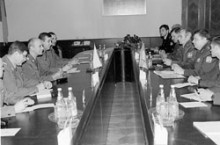On November 20 Russian President Vladimir Putin ordered the Russian military command to form and fully deploy two powerful permanent alert army groups in the southwestern and Central Asian directions. This is to be the Russian military leadership’s most important goal during the next five years, with both group to use the most sophisticated equipment and techniques, including those of target planning.
The forthcoming formation of the Southwest Group can and must raise a host of questions in Kyiv, for Ukraine is Russia’s immediate neighbor to the southwest and pointing a new military formation in our direction could basically alter the current geopolitical situation in Europe.
Some Russian media already opine that Moscow is proceeding from the calculation that Ukraine will join NATO sooner or later, and Russia should prepare.
Kyiv so far remains calm to the latest news from the northeast. “Ukraine is carefully studying developments in neighboring countries’ defense priorities,” Ukraine’s Chief of General Staff Volodymyr Shkidchenko, said in this connection after meeting his Polish counterpart, Czeslaw Piatas, noting that this means formation of a grouping based on the Northern Caucasian Military District.
Whether Ukraine will join NATO is not currently being discussed in Kyiv. Nor was this point discussed by the chiefs of the armed forces general staffs of Ukraine and Poland, the latter being, incidentally, an alliance member. Yet, Ukraine maintains together with Poland a joint peacekeeping battalion now carrying out missions in Kosovo, and has its own vision of further military cooperation with NATO and individual member states. In particular, it is planned to form at least one more joint battalion.
If Mr. Putin’s assignment is to be fulfilled, the question of Ukrainian neutrality and its guarantees may become an even more acute issue than it was during the talks on the removal of nuclear weapons from Ukrainian territory. Earlier, the top Ukrainian military leadership has repeatedly said that nothing — including the country’s neutrality — is eternal. In principle, some public speeches did not rule out Ukraine’s possible future NATO membership. But the Presidential Administration and Foreign Ministry have stressed that this is the question of joining a security mechanism, not a military bloc.
The past year passed under the sign of extended Ukrainian-Russian military cooperation, plus the fact that Ukrainian early-warning radar installations work for Russia’s antimissile defense system.
Russia itself makes occasional statements that it does not rule out its own future NATO membership, which the West more often than not sees as a provocation.
Thus Pres. Putin’s assignment can be viewed from two standpoints: either Moscow views Ukraine as a threat to its security should the latter discard its neutral status, or, on the contrary, it relies on Kyiv as an ally. In each of these cases, there can be different assessments of the situation, but what Ukraine will inevitably have to do is make a choice.
Meanwhile, Western Europe is also ready to make its own practical contribution to changing the geopolitical pattern by starting to form the Eurocorps, a joint 60,000 strong rapid deployment force outside NATO jurisdiction. There is both skepticism and hope heard about the Eurocorps, but its creation, recently discussed by EU defense ministers, could undoubtedly become the first step in the EU’s independent security policy. The situation is all the more interesting because Ukraine’s neighbors — Poland and Hungary, already NATO members — will soon join the EU.
That the West is taking into account the Russian factor was demonstrated by the latest statement of Chancellor Gerhard Schroeder of Germany (www.reuters.com): the US military presence in Europe remains a crucial factor of stability, and NATO is still open to new members.







